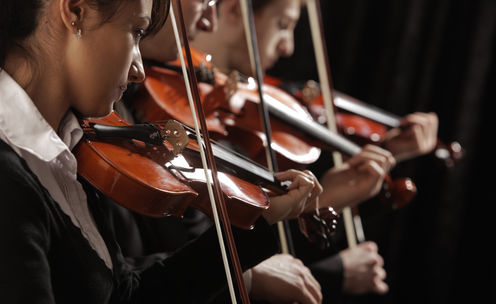Patients with early post-infarction angina, episodes of chest pain after a heart attack, reported
significantly lower levels of anxiety and pain if they listened to music for 30 minutes a day. While that's hard to pin down biologically, 700,000 people survive a heart attack just in the U.S. each year and roughly 1 in 9 heart attack survivors experience subsequent episodes of chest pain and anxiety within the first 48 hours, so whatever works to reduce that.
The researchers recruited 350 patients diagnosed with heart attack and early post-infarction angina at a medical center in Serbia. Half were randomly assigned to receive standard treatment while half were assigned to regular music sessions in addition to standard treatment. For most patients, standard treatment included a variety of medications such as nitrates, aspirin, clot-preventing drugs, beta blockers, statins, calcium channel blockers, blood pressure-lowering medications and the angina-reducing drug ranolazine.

Patients receiving music therapy first underwent a test to determine which musical genre their body was likely to respond to positively. Participants listened to nine 30-second samples of music they found soothing, while researchers assessed each participant's body for automatic, involuntary responses to the music samples based on dilation or narrowing of the pupils. Researchers then fine-tuned the selection by working with the patient to determine the optimal music tempo and tonality.
Participants were asked to listen to their designated musical selection for 30 minutes each day whenever it was convenient for them to sit, ideally while resting with their eyes closed. Patients continued with these daily listening sessions for seven years, documenting their sessions in a log. They returned to the medical center for follow-up assessments every three months for the first year and annually thereafter.
At the end of seven years, music therapy was found to be more effective than standard treatment alone in terms of reducing anxiety, pain sensation and pain distress. The patients with music therapy, on average, had anxiety scores one-third lower than those on standard treatment and reported lower angina symptoms by about one-quarter. These patients also had significantly lower rates of certain heart conditions, including an 18% reduction in the rate of heart failure; 23% lower rate of subsequent heart attack; 20% lower rate of needing coronary artery bypass graft surgery; and 16% lower rate of cardiac death.
The new data are anecdotal but suggest music may be an adjuvant for those who are helped. It won't take the place of medicine, don't let naturopaths or other alternatives-to-medicine gurus try to claim it does, but in combination with standard therapies such as medications, music could be a simple, accessible measure that patients can do at home to potentially reduce symptoms and therefore help prevent subsequent cardiac events.
"There have been very few studies analyzing the effects of music on heart conditions," said Predrag Mitrovic, MD, PhD, professor of cardiology at the University of Belgrade School of Medicine and the study's lead author. "Based on our findings, we believe music therapy can help all patients after a heart attack, not only patients with early post-infarction angina. It's also very easy and inexpensive to implement."





Comments